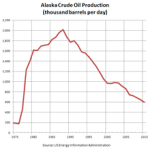Not if you understand what is being said. Perhaps its the Rose Coloured glasses that prevent understanding, simply dismissing issues being raised as alarmist?
I am using the term just as it is used in the articles and examples I gave, nothing more, nothing less.
Simply not true. Your bullshit article on "peak food production" uses it to mean when the growth rate of production peaks, every one else, including in the links you gave us, talks about when production itself peaks.
And obviously there are several different references being use and issues referred to.
In the case of peak oil:
See, that's a peak in the raw production rate. Now be so kind and have a look at the raw data underlying your peak foods production nonsense, I provided a link. You'll find production in all of the commodities for which they say w we're past peak is still growing.
You asked for examples of how the term 'peak food' etc is being used and I gave examples of usage. The graphs describe exactly what is meant by the term.
The issue was, is now and always will be sustainability. It is not about conditions right now, but the problems most likely to emerge as climate change, resource overuse and greater demand becomes a greater burden on our ecosystems and resources.
This is simply about sustainability. And I think that any reasonable observer would agree that current human activity is not sustainable, yet alone growing demand for goods and services.
All the rest is window dressing. Nitpicking over this detail or wailing and gnashing your teeth over how this or that is phrased, changes nothing in terms of the fundamentals. That if we don't change our ways soon, well before the end of the century - in your own words - we are fucked.
Quote:
Humans are completely living beyond their ecological means, says a major report published by the UN Environment Programme on Thursday.
The 550-page document finds the human ecological footprint is on average 21.9 hectares per person. Given the global population, however, the Earth’s biological capacity is just 15.7 hectares per person.
The report is UNEP’s latest on the state of the planet’s health, taking five years in the making. It was put together by about 390 experts and peer-reviewed by an additional 1000.
It reviews the state of Earth’s natural resources, from the atmosphere and water, to land surfaces and biodiversity. It concludes that instead of being used and maintained as a tool for the sustainable development of human populations, the environment is being sucked dry by unsustainable development.
Examples of how humans are over-exploiting natural resources to their own detriment include:
Water – by 2025, 1.6 billion people will live in countries with absolute water scarcity; 440 million school days are already missed every year because of diarrhoeal diseases.
Land use – modern agriculture exploits land more intensively than it has in the past. In 1987, a hectare of cropland yielded on average 1.8 tonnes of crops, today the same hectare produces 2.5 tonnes. This increased productivity comes at a cost – overexploited land is degraded and becomes less productive.
Fish – 2.6 billion people rely on fish for more than 20% of their animal protein intake, yet as the intensity of fishing increases, the biodiversity of the ocean and the ocean’s capacity to produce more fish decreases.
Air – more than 2 million people die each year because of indoor and outdoor pollution.
Unsustainable consumption
The individual average footprint of 21.9 hectares per person estimated by UNEP, includes the areas required to produce the resources we use, as well as the areas needed to process our waste.
“About half of the footprint is accounted for by the areas that are required to absorb our greenhouse gas emissions,” says Neville Ash of the UNEP World Conservation Monitoring Centre, underlying the scale of the climate change problem. “The other half is the land which produces our food, the forests which produce our timber, the oceans and rivers which produce our fish.”
The inflated size of the footprint, says Ash, is partially the result of the growth of the human population. The population is currently estimated at 6.7 billion people, and is expected to reach 8 to 10 billion by 2050.
But for Ash, the main driver of the size of our footprint is our unsustainable consumption. “There is no doubt that we could sustain the current and projected population if we lived sustainably,” he told New Scientist.
‘Inexorable decline’
According to the report authors, energy efficiency is key to sustainability. Johan Kuylenstierna of the Stockholm Environment Institute says that the growth of greenhouse gas emissions in developing nations could be halved by 2020 simply by using existing technologies for energy efficiency.
According to Jo Alcamo, at the University of Kassel in Germany, who led the group which looked at future development for the report, open borders and free trade could also be important. In models of the future where trade between countries is made simpler, technologies that improve the sustainable use of resources are adopted more quickly.
“Much of the ‘natural’ capital upon which so much of the human wellbeing and economic activity depends – water, land, the air and atmosphere, biodiversity and marine resources – continue their seemingly inexorable decline,” warns Achim Steiner, UNEP executive director.
“The cost of inaction and the price humanity will eventually pay is likely to dwarf the cost of swift and decisive action now.”


